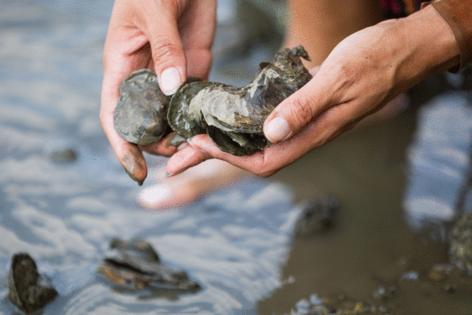More than 100,000 oysters were grown in Virginia this year. Here's why it matters
Published in News & Features
NORFOLK, Va. — More than 110,000 oysters were planted and raised through oyster gardening in Virginia in 2024, a near-record, environmentalists said.
The Chesapeake Bay Foundation hosts oyster gardening programs, at which volunteers become a “foster parent” for a few hundred baby oysters. After taking a seminar, volunteers can begin growing oysters using wire cages on a private dock, community pier, marina or waterfront business.
Once grown, the adult oysters are returned to the foundation to be planted on sanctuary reefs after growing for about a year. After the oysters are transplanted, oyster gardeners can begin a new batch.
Restoration of oysters help coastal communities vulnerable to sea level rise, like Hampton Roads. Living shorelines that include oyster shell reefs are a natural approach to protecting them from erosion, and healthy oyster reefs can also help protect the habitats that capture and store carbon. Oysters filter sediment and algae from the water, up to 50 gallons of water a day, increasing the clarity that is needed for Chesapeake Bay vegetation to receive enough sunlight. At the same time, they deposit nutrient-rich organic matter on the bottom that supports growth.
With the oysters grown in 2024, more than 5 million gallons of water each day can be filtered once they reach adulthood, according to the foundation. Earlier this year, the Chesapeake Oyster Alliance officially surpassed 6 billion oysters added to the Chesapeake Bay since 2017. By 2025, the alliance aims to introduce 10 billion oysters through efforts in restoration and aquaculture.
“There’s nothing quite like the connection between these baby oysters and their foster parents,” said Jessica Lutzow, the foundation’s oyster restoration specialist in Virginia. “The dedication and love it takes to raise these oysters, from cleaning cages to sending them off to live out on sanctuary reefs, is nothing short of special.”
Now, 64 families and organizations have agreed to raise oysters at public docks and marinas rather than private waterfront property. Claire Neubert, an oyster gardener at one of the Hampton docks, said she initially raised oysters to give back to the planet, but it has since “changed the trajectory” of her life.
“I live in an urban environment, and it’s amazing to find these babies flourish given all the challenges they face,” Neubert said. “At the end of the day, it really becomes a question of who’s growing who.”
_____
©2024 The Virginian-Pilot. Visit at pilotonline.com. Distributed by Tribune Content Agency, LLC.







Comments